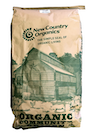25 hours. That’s how long it takes for one chicken egg to develop. While that seems like a long time, the truth is that proper egg development actually begins long before the formation of any one egg. It begins when the laying hen is just a chick. Nutrition and general maintenance throughout the early life stages of a bird are what truly sets the tone for good (or poor) production throughout the rest of its life.
The immune system, skeleton, digestive tract, and physical attributes of a chick develop rapidly within the first few weeks of life (1). That’s why it’s important to have a complete, balanced feed that includes microorganisms to support gut health from day one. We formulate our Starter Feed and Starter Crumble with fresh organic grains, kelp, vitamins, minerals, and probiotics to fully meet the development needs of chicks.
A 21% protein diet is generally recommended to meet a chick’s accelerated growth and energy needs. It is also important to be sure that the vitamin/mineral profile of your feed is just right for your chick’s stage of development, as feeding adult feed prematurely or feeding an imbalanced ration can lead to developmental issues that manifest in the legs, reproductive organs, and other body systems.
Size Matters
Since chicks’ digestive tracts are still developing, most starter feeds are a fine grind or crumble. This prevents blockage from occurring within the crop or other parts of the GI tract and ensures better breakdown and absorption of nutrients. Starter grit and an abundance of fresh water are also necessary for proper digestion and vitality.
Once chicks reach 5 weeks of age, they are ready for a chunkier, lower protein feed. A decrease in protein aids in a slower growth for better-controlled weight and structural development while also allowing the reproductive system time to develop properly. Our Grower/Broiler feed is 19% protein, which is lower than the Starter but still high enough to meet feather production needs.
Calci-Yummm (And Other Important Stuff)
At 16 weeks of age, pullets are ready to be slowly transitioned to a layer feed. Our Layer Feed is 17% protein and higher in calcium than feeds earlier in the developmental stages to sustain the body’s production demands. Calcium is necessary for egg development, as the eggshell is approximately 94% calcium (1). The fine consistency of the calcium in the feed is quickly absorbed, whereas the coarser texture of, say, a Calcium and Poultry Shell supplement, has a slower release. Both are beneficial, as your hard-working ladies need calcium to support both their own bodies and their productivity.
High quality feed for your flock is crucial for good gut health, and good gut health is necessary for nutrient absorption and overall vitality. Probiotics and balanced vitamins and minerals are important for both a hen’s health, as well as the health of the egg she produces. Dr. Kayla Price, poultry technical manager with Alltech Canada, explained in a webinar on egg health how minerals functioned in egg development:
"Selenium is used for cellular protection of the reproductive tract. Copper is used for eggshell development, pigment, and collagen formation. Manganese is important for the eggshell membrane and helps with the formation of bone and the organic matrix of eggshells. Zinc can be used for bone and eggshell calcification, keratin shell membrane formation, and eggshell carbonate production." (1)
When you choose New Country Organics feeds, you are choosing a program that supports your flock’s health and productivity from start to finish by providing all essential nutrients and none of the artificial preservatives or pesticides that come with conventional programs.
Wait! Water, Please!
While feed quality greatly influences productivity, water is the #1 forgotten nutrient in any livestock operation. Every process in the body utilizes water, particularly cell communication and function. Dehydration can lead to poor nutrient absorption, which will then lead to decreased productivity and vitality. Good management of your flock’s living area reduces the risk of disease and bacteria build up in your chickens’ water. Keep your ladies hydrated!
Sources
- King, Deven. “How hen nutrition impacts egg shell quality.” WATTAgNet. WATTAgNet, 12 Nov. 2017. Web. https://www.wattagnet.com/articles/32592-how-hen-nutrition-impacts-egg-shell-quality







